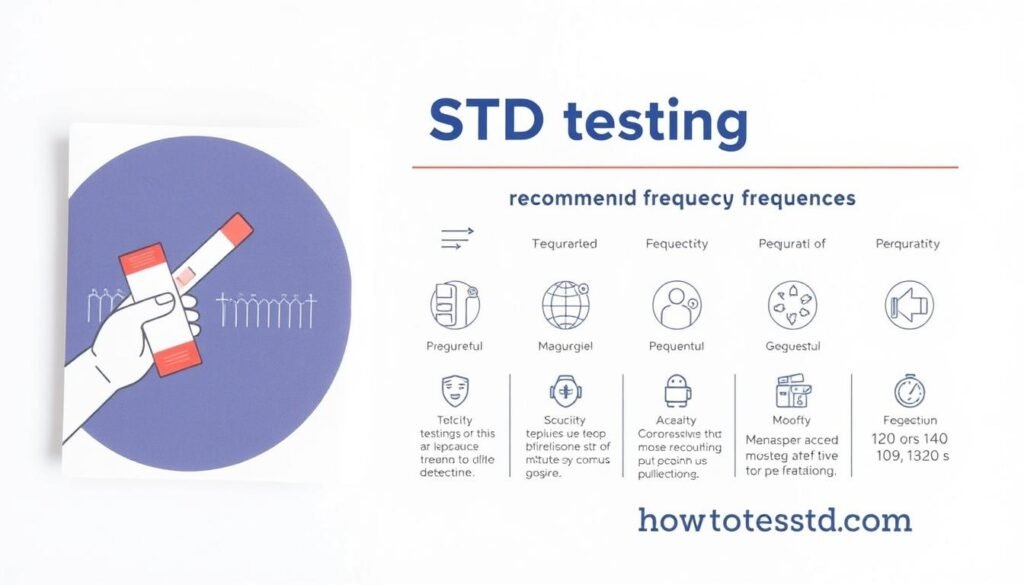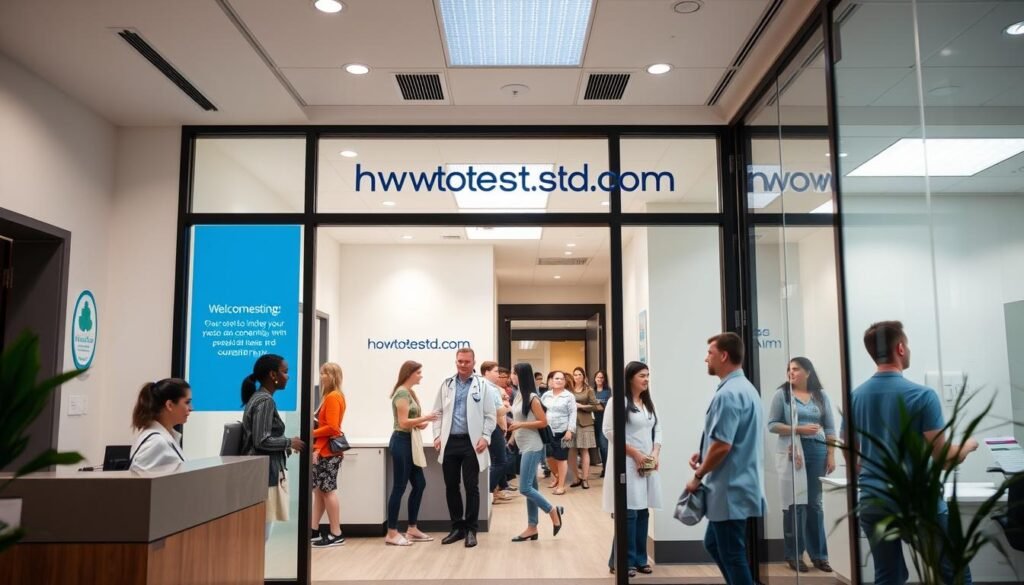LGBTQ+ STD Testing: Protect Your Sexual Health
The LGBTQ+ community faces big challenges in getting sexual health care. They have higher rates of STDs than others. This is because of discrimination, stigma, and not enough inclusive sex education.
It’s very important to take care of your health. Getting regular STD testing can find and treat infections early. This helps avoid serious health problems later. It’s key to find LGBTQ+-friendly health services where you feel safe and not judged.
Key Takeaways
- Regular STD testing is vital for the LGBTQ+ community.
- LGBTQ+-friendly health services can provide a safe environment.
- Early detection and treatment can reduce health complications.
- Proactive healthcare planning is essential.
- Discrimination and stigma can impact access to sexual health care.
The Importance of Sexual Health in the LGBTQ+ Community
Keeping sexual health in check is key for feeling good, even more so for the LGBTQ+ crowd. It’s not just about avoiding sickness. It’s about feeling your best every day.
Unique Health Considerations
The LGBTQ+ community deals with unique health challenges. Things like stigma, discrimination, and hard times getting to doctors can up the risk of STDs. LGBTQ+ friendly STD testing is a must for catching and treating diseases early.
Why Being Proactive Matters
For the LGBTQ+ community, being ahead of the game with sexual health is essential. Regular tests and staying informed can cut down STD risks a lot. It’s about knowing the risks of different activities and where to get LGBTQ+ community testing options.
Long-term Health Benefits
Getting regular STD tests can bring long-term health perks. It helps catch and treat infections early. This can stop big health problems from happening later.
Early Detection Advantages
Early detection of STDs is key for good treatment and stopping more spread. The LGBTQ+ community can really benefit from catching diseases early. This matches up with the idea of LGBTQ+ friendly STD testing.
STD Testing for LGBTQ+ Individuals: What You Need to Know
LGBTQ+ people face special challenges with STDs. They need to test often. This is because they have unique health needs and risks.
Risk Factors Specific to LGBTQ+ Communities
The LGBTQ+ community has special risks for STDs. These include:
- Higher rates of certain STDs due to social and healthcare disparities
- Increased vulnerability due to lack of targeted health resources
- Barriers to accessing appropriate healthcare services
Knowing these risks helps fight them. For more info, visit 247 Lab Kit’s LGBTQ+ Testing Considerations.
Breaking Down Testing Stigma
STD testing stigma is big for LGBTQ+ people. We can fight this by talking openly and learning more. It’s important to create a supportive testing culture.
The Cost of Delayed Testing
Waiting to get tested can harm your health. It can make infections worse and spread to others. Testing often is key to staying healthy.
By knowing the risks and acting early, LGBTQ+ people can keep their health safe. Using LGBTQ+ friendly STD clinics and getting LGBTQ+ sexual health resources is important.
Common STDs to Test For
Testing for STDs is very important for sexual health. This is true for the LGBTQ+ community, where some infections are more common. Knowing about common STDs helps keep everyone healthy.
HIV and AIDS
HIV is a big worry in the LGBTQ+ community. Testing for HIV often is key. It helps catch the disease early, when it’s easier to treat. AIDS is the last stage of HIV without treatment.
Syphilis, Gonorrhea, and Chlamydia
Syphilis, gonorrhea, and chlamydia are bacterial infections spread by sex. Syphilis can cause serious problems like heart issues and brain problems. Gonorrhea and chlamydia can lead to infertility and increase HIV risk. It’s important for LGBTQ+ people to get tested for these.
| STD | Transmission | Consequences if Untreated |
|---|---|---|
| Syphilis | Sexually transmitted | Heart problems, neurological issues |
| Gonorrhea | Sexually transmitted | Infertility, increased HIV risk |
| Chlamydia | Sexually transmitted | Infertility, increased HIV risk |
Hepatitis and HPV
Hepatitis is inflammation of the liver, often from viruses. Hepatitis B and C can spread through sex. HPV (Human Papillomavirus) is another common STD that can cause health problems, like some cancers. There’s a vaccine for HPV.
Emerging Concerns in LGBTQ+ Health
New worries in LGBTQ+ health include antibiotic-resistant gonorrhea and the ongoing HIV problem. Knowing about these and testing often helps protect sexual health.
By knowing the risks and testing often, LGBTQ+ people can stay healthy. LGBTQ+ inclusive testing centers offer a safe place for testing and talking about health.
Recommended Testing Frequency and Guidelines
It’s key to know how often to get tested for STDs in the LGBTQ+ community. The rules for testing depend on your risk and how often you have sex.
Guidelines Based on Sexual Activity
How often you should get tested changes based on your sex life. If you have many partners or don’t use protection, you might need to go more often. UCSF Transgender Care says to test every 3 to 6 months if you’re sexually active.
Special Considerations for Different LGBTQ+ Subgroups
Each part of the LGBTQ+ community has its own needs for STD testing.
Gay and Bisexual Men
Gay and bisexual men face a higher risk of HIV and syphilis. They might need to test every 3 months.
Lesbian and Bisexual Women
Lesbian and bisexual women might not be as high-risk, but they should test regularly. This is true if they have many partners or take risks.
Transgender and Non-Binary Individuals
Transgender and non-binary folks might find it harder to get tested. But, they should test based on their sex life and risk, not their gender.
Creating Your Personal Testing Schedule
To make a testing plan, think about your sex life, partners, and STD history. Talking to a doctor can help make a plan just for you.

LGBTQ+ Friendly Testing Options and Resources
LGBTQ+ folks can now find many STD testing options that are welcoming. It’s important to find a test that feels right for you. This way, you get the care you need without feeling judged.
Community Health Centers
Community Health Centers (CHCs) are great for LGBTQ+ people looking for STD tests. They offer affordable, private, and culturally aware services. Plus, they have a payment plan for those who can’t pay full price.
LGBTQ+ Specific Clinics
LGBTQ+ clinics are safe and welcoming for STD tests. The staff knows about LGBTQ+ health needs. They offer many services, from basic tests to special care.
Telehealth and At-Home Testing Options
Telehealth and at-home tests make getting STD tests easy. Telehealth lets you talk to doctors online. At-home tests let you collect samples by yourself. These are good for those far from LGBTQ+ friendly clinics.
Finding Affirming Healthcare Providers
Finding doctors who understand LGBTQ+ health is key. Ask friends, check online, or contact LGBTQ+ groups for help. Many organizations have lists of LGBTQ+ friendly doctors.
Think about cost, privacy, and the doctor’s LGBTQ+ experience when choosing a test. Picking the right service helps you get tested and cared for.
| Testing Option | Benefits | Considerations |
|---|---|---|
| Community Health Centers | Affordable, confidential, culturally competent | May have limited specialized LGBTQ+ services |
| LGBTQ+ Specific Clinics | Safe, welcoming, knowledgeable staff | May have limited availability or higher costs |
| Telehealth and At-Home Testing | Convenient, private, accessible | May lack personal interaction, require follow-up |
Navigating Insurance and Cost Concerns
It’s important to get affordable STD testing. Knowing about insurance is key. For LGBTQ+ folks, dealing with healthcare costs can be tough.
Insurance Coverage for STD Testing
Many health plans cover STD testing, including those from the Affordable Care Act (ACA). Preventive services, like some STD screenings, are often free. But, what’s covered can change based on your plan and doctor. Always check your policy or call your insurer to know what’s included.
| Insurance Plan | STD Testing Coverage | Out-of-Pocket Costs |
|---|---|---|
| ACA Marketplace Plans | Often covers preventive STD screenings | Usually $0 copay for preventive services |
| Employer-Sponsored Plans | Varies by plan; check policy details | Depends on plan; may have copays or coinsurance |
| Medicaid | Covers STD testing; specifics vary by state | Often $0 copay; may have income requirements |
Free and Low-Cost Testing Resources
If you don’t have insurance or can’t afford it, there are ways to get tested. Community health centers and LGBTQ+ clinics offer affordable tests.
Government Programs
Community health centers get funding from the Health Resources and Services Administration (HRSA). They offer tests for a fee based on how much you make. Some state and local health departments also offer free or cheap STD tests.
Community Organizations
Groups like the AIDS Institute and the Human Rights Campaign help find affordable STD testing.
“Access to affordable healthcare is a fundamental right, and there are organizations dedicated to ensuring that the LGBTQ+ community can access the care they need.”
By knowing about your insurance and looking for free or low-cost tests, you can stay healthy. 
Overcoming Barriers to Regular Testing
It’s key to get over barriers to STD testing for LGBTQ+ folks. Regular tests are vital for sexual health. By tackling these barriers, we can boost health outcomes.
Addressing Stigma and Discrimination
Stigma and discrimination stop many from getting tested. Creating a welcoming and inclusive environment in healthcare is important. Places that are safe and welcoming for LGBTQ+ folks are essential.
- Training healthcare providers on LGBTQ+ issues
- Implementing non-discriminatory policies
- Ensuring confidentiality and privacy
Confidentiality and Privacy Concerns
Privacy and confidentiality are big worries for LGBTQ+ folks. Confidential testing services help ease these fears. Many resources stress the need for privacy.
Some important steps include:
- Secure online platforms for testing and results
- Private consultation rooms
- Confidential billing and insurance processing
Mental Health Aspects of Testing
The mental health side of STD testing is important. Testing can cause a lot of stress. Providing mental health support with testing helps a lot.
Key steps are:
- Pre-test counseling to address concerns
- Post-test support for those receiving positive results
- Referral services for ongoing mental health support
Support Systems and Resources
Strong support systems and resources are key for regular testing. LGBTQ+ community health centers and online resources are vital. They offer info, testing, and support.
Prevention Strategies and Holistic Sexual Health
Keeping the LGBTQ+ community healthy is key. We need to use safe sex, medicines, talk openly, and test often. This helps lower the risk of STDs.
Safe Sex Practices for LGBTQ+ Individuals
Safe sex is the first step in preventing STDs. LGBTQ+ folks should always use condoms and dental dams. Condoms are very good at stopping many STDs, including HIV. Pick the right lubricants to keep condoms safe. Water-based or silicone-based lubricants are best because they don’t harm condoms.
PrEP, PEP, and Other Preventative Medications
PrEP and PEP are key in stopping HIV. PrEP is taken daily to prevent HIV before it happens. PEP is taken after to stop HIV after it happens. These medicines work well if used right. Vaccines for hepatitis A and B also help keep you healthy.
Communication with Partners
Talking openly with partners is very important. Talk about STDs, past sexual history, and what you’re comfortable with. Testing regularly is part of this talk. It helps both partners know their health status and make smart choices.
Integrating Testing into Overall Wellness
STD testing is part of staying healthy. It’s like going to the dentist or a doctor. Regular tests help catch and treat STDs early. Testing often keeps you safe and healthy in the long run.
Conclusion
Regular STD testing is key for good sexual health, very important for LGBTQ+ folks. It helps keep you and your partners safe from STDs.
STD testing is a big part of staying healthy for LGBTQ+ people. It helps you know what’s going on with your body. This way, you can make smart choices about your health.
There are many ways to get STD testing, like health centers and online services. Using these options and practicing safe sex can lower STD risks a lot.
Testing for STDs often can catch problems early. This means less chance of serious health issues later. Start taking care of your sexual health now. Encourage friends to do the same. This helps make our community healthier and more supportive.
FAQ
What are the most common STDs that LGBTQ+ individuals should be tested for?
LGBTQ+ folks should test for HIV, syphilis, gonorrhea, chlamydia, hepatitis, and HPV. These STDs can be serious if not treated.
How often should I get tested for STDs as an LGBTQ+ individual?
Testing frequency depends on your activity and risk. Test every 3-6 months if you have many partners.
What are some LGBTQ+ friendly testing options and resources?
Look for community health centers, LGBTQ+ clinics, and telehealth services. You can also find at-home kits. Search online for supportive healthcare providers near you.
Will my insurance cover STD testing?
Many insurances cover STD tests, but it varies. Check with your provider. Also, look for free or low-cost options in your area.
How can I overcome stigma and anxiety related to STD testing?
Seek LGBTQ+ friendly resources and talk to a trusted doctor. Connect with support groups. Remember, testing is key to good sexual health.
What are some prevention strategies for maintaining good sexual health as an LGBTQ+ individual?
Practice safe sex, use PrEP or PEP, and get vaccinated. Also, talk openly with your partners about health.
Can I get tested for STDs at home?
Yes, home kits are available. Choose a reputable, FDA-approved one. If positive or unsure, see a doctor.
How can I find affirming healthcare providers for STD testing?
Search online, ask LGBTQ+ groups or friends, and check with your insurance. Look for providers who work with LGBTQ+ folks.


